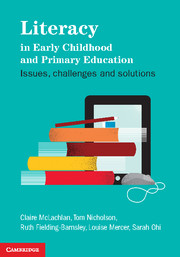Book contents
- Frontmatter
- Contents
- List of figures
- List of tables
- About the authors
- Acknowledgements
- Chapter 1 Introduction
- Part 1 Literacy acquisition: the child, the family and diversity in the modern world
- Chapter 2 Literacy acquisition in the early years: past, present and future
- Chapter 3 When should children start literacy learning?
- Chapter 4 Family literacies and relationships with centres and schools
- Chapter 5 Multiliteracies: growing the next generation of readers
- Chapter 6 Diverse classrooms and learning in bilingual and multicultural/multilingual settings
- Part 2 Learning about literacy in early childhood settings
- Part 3 Literacy learning in the primary school
- Part 4 Literacy learning in the senior primary school
- References
- Index
- References
Chapter 3 - When should children start literacy learning?
from Part 1 - Literacy acquisition: the child, the family and diversity in the modern world
- Frontmatter
- Contents
- List of figures
- List of tables
- About the authors
- Acknowledgements
- Chapter 1 Introduction
- Part 1 Literacy acquisition: the child, the family and diversity in the modern world
- Chapter 2 Literacy acquisition in the early years: past, present and future
- Chapter 3 When should children start literacy learning?
- Chapter 4 Family literacies and relationships with centres and schools
- Chapter 5 Multiliteracies: growing the next generation of readers
- Chapter 6 Diverse classrooms and learning in bilingual and multicultural/multilingual settings
- Part 2 Learning about literacy in early childhood settings
- Part 3 Literacy learning in the primary school
- Part 4 Literacy learning in the senior primary school
- References
- Index
- References
Summary
Chapter objectives
To explain some of the misunderstandings and myths about when children should start literacy learning.
To explore the outcomes of international studies on literacy achievement and how this relates to when children start literacy learning.
To examine differences among countries and pedagogies in the ages of starting school.
This chapter explores our beliefs about when to begin formal reading and writing instruction. It examines enduring social and cultural beliefs about maturational readiness and delaying reading instruction. It also considers the outcomes of international studies on literacy achievement. Further, the chapter examines differences in ages of starting school and the pedagogy of beginning and ongoing reading instruction.
Overview
When did you first start learning to read? Many of us will not remember, especially if we had no difficulties, but we might remember one of our siblings having difi culty, even in the first stages of schooling. Our sister may have squirmed and been unhappy when an adult read a book to her, and she may not have liked books. At school, she might have said she was ‘dumb’ and may have had to sit alone at a desk to do her work while her classmates worked in groups, completing their worksheets with ease while their ‘dumb’ classmate had trouble even knowing what to do, and usually not completing the task the teacher set her.
- Type
- Chapter
- Information
- Literacy in Early Childhood and Primary EducationIssues, Challenges, Solutions, pp. 35 - 47Publisher: Cambridge University PressPrint publication year: 2012



